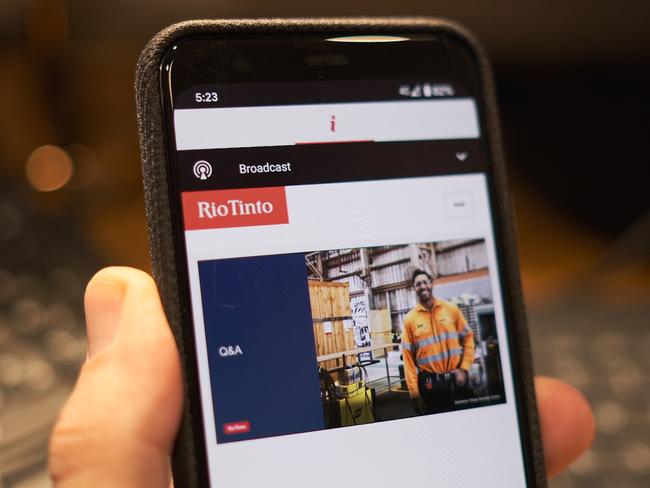Energy key to pandemic recovery, says Rio
Rio Tinto boss Jean Sebastien Jacques says sorting out Australia’s long-term energy policy should be a key plank in the post-pandemic plan.

Rio Tinto boss Jean Sebastien Jacques says sorting out Australia’s long-term energy policy should be a key plank in the federal government’s plans to bring the national economy back from the coronavirus crisis, saying cheap and reliable power is one of the keys to economic recovery.
Speaking to Rio shareholders at the company’s annual Australian shareholder meeting – which for the first time was held as a fully virtual meeting on Thursday night – Mr Jacques reiterated Rio’s concerns about the future of its Australian aluminium assets, telling shareholders the company was engaged with the Nev Power-led recovery commission, and cheap energy was a focus of its discussions.
Mr Jacques identified Australia’s education system as another focus for the long-term economic future, as the government approached what Rio chair Simon Thompson described as a “unique” opportunity to re-set the global economy.
The Rio chief executive told shareholders the company’s global operations were coping well with the coronavirus crisis but warned against a lapse into complacency as “we believe the full economic impact of the pandemic is yet to be felt”.
Mr Jacques said Rio had identified long-running concerns about high energy prices, particularly on the nation’s east coast, as a key issue as the government develops a strategy to bring the economy out of the coronavirus gloom.
“We are engaging with multiple parties, including with the taskforce established by the Prime Minister and led by Nev Power, to propose a comprehensive set of initiatives and ideas on how we can restart the economy in Australia as quickly as we can,” he said.
“My sense is those initiatives will cover things that are important not only for the short term but for the long term — for example, education is going to be absolutely critical in order to make sure we have the right skill set, in terms of the digital economy as an example, because today the truth of the matter is that we know in Australia we have some gaps.”
Mr Jacques said a competitive energy policy was a key concern for Rio as it considered the future of its aluminium assets.
“Another issue is around energy policy to make sure that in Australia all industries can access a reliable and cheap source of energy in order to operate in a competitive landscape,” he said.
The Rio chief executive did not directly link the future of Rio’s aluminium smelters to energy policy outcomes, but the company has been lobbying state and federal governments — and its power providers — to get a cheaper deal for its assets in Queensland, NSW and Tasmania.
“The aluminium market has been pretty challenging for some time and our aluminium assets in Pacific Aluminium have been under pressure,” he told shareholders.
“We need to find a viable and sustainable solution — and it’s primarily in relationship to power because they are very well-run. The big issue they are facing is their cost, and that’s around their power cost.”

In good news for Rio’s dominant iron ore division, Mr Jacques said the company’s best information indicated Australia’s biggest trading partner was back to “business as usual”.
He said China was back to normal, with Rio’s teams in both Beijing and Shanghai having returned to work.
“We have also connected with our customers in China and it is reassuring to hear it is business as usual for them,” he said.
His comments came as the latest Chinese trade data shows iron ore imports rose 5.4 per cent to 360 million tonnes, compared with the previous comparable period, underlining the strength of the sector through the coronavirus crisis.
Australian trade data for March shows the rise in iron ore exports in the period — and the end of the February lockdown in China — helped to more than double the month’s trade surplus to a record $10.6bn, with metal ore exports up by a third, or $2.8bn, amplified by a lift in iron ore prices in Australian dollar terms.
Mr Thompson reiterated his calls for a green technology-led recovery from the coronavirus crisis, telling shareholders governments had made a good start in dealing with the crisis, but should look to the future when recovery plans are shaped.
“The unprecedented social and economic challenges that we face present a unique opportunity for governments, communities, unions, civil society and business to work together — as we have done so effectively during the crisis — not only to restart the economy, but also to redirect it on to a pathway towards a more resilient and sustainable future ... by investing in the new technologies and skills that we need to build sustainable economic prosperity.
“We continue to engage with governments, business, investors and civil society organisations around the world on the policy measures required to accelerate the energy transition, by providing incentives for business to invest in new low-carbon technology, particularly in ‘hard-to-abate’ sectors such as steelmaking and aluminium.”
On Wednesday Mr Thompson put his signature on a call from the Rio-backed Energy Transitions Committee for a “massive” wave of green energy-focused stimulus measures to help global economies out of the coronavirus crisis.
The group, a coalition of 40 global businesses including energy majors such as BP and Shell, called on governments to support “a massive wave of investments in renewable electricity” and other low-carbon energy solutions when devising plans for the economic recovery from the COVID-19 pandemic.

